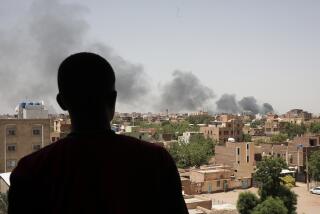Soviets Urged to Back U.N. Force in Iraq : Kurds: Baker says Americans can’t leave unless Moscow permits international protection for refugees.
- Share via
CAIRO — Secretary of State James A. Baker III, responding to growing Soviet concern about the presence of U.S. combat troops in northern Iraq, said Monday that American forces cannot withdraw unless Moscow permits the United Nations to assume responsibility for the safety of Kurdish refugees.
In comments to reporters after a two-hour meeting, Baker and Soviet Foreign Minister Alexander A. Bessmertnykh made it clear that the United States and the Soviet Union remain at odds over the care and protection of displaced people in northern Iraq.
Bessmertnykh said Moscow does not want to infringe on Iraqi sovereignty, implying that the U.S. proposals would do just that.
“A thin line separates the necessity for humanitarian support and the concerns for sovereignty of a country,” Bessmertnykh said. “It is a very intricate balance.”
He said he and Baker will “be in touch on that further”--diplomatic language for an unresolved difference of opinion.
The Bush Administration would like to replace American and allied combat troops in the Kurdish security zone with U.N.-sponsored peacekeeping forces, either soldiers or civilian police. However, U.N. Secretary General Javier Perez de Cuellar has said that creation of such a U.N. force would require Security Council action.
U.S. officials have said that Security Council approval is unlikely because the Soviet Union--and perhaps China--could be expected to veto the deployment of international forces to protect an ethnic minority within the territory of a U.N. member state. These officials say Moscow is concerned that such a precedent could be applied to festering Soviet ethnic controversies such as those in Armenia, Georgia and the three Baltic republics.
However, Baker said last week that the United States “should seek another resolution by the United Nations Security Council” if that is the only way to replace U.S. troops.
“I, for one, am not willing to accept the judgment of some that that is an impossibility,” he said, “because I think the countries on the Security Council . . . are concerned about the humanitarian situation there.”
In recounting his meeting with Bessmertnykh, Baker said: “I pointed out to the minister that the United States stepped into the breach . . . because we did not feel that anyone else was in a position to do what had to be done to save lives. It is our desire to see United States forces removed from northern Iraq, just as soon as we can do so with due regard for the safety of the Kurdish population.
“It is very important, in our view, that the United Nations or other international relief agencies come into northern Iraq and pick up the responsibility for humanitarian relief for the Kurdish population there,” he said.
The meeting was the second in two days between Baker and Bessmertnykh, who are on complementary tours of the Middle East to line up support for a regional peace conference, jointly sponsored by Washington and Moscow. Despite differences of opinion on northern Iraq, Baker and Bessmertnykh expressed common objectives regarding Israel and its Arab adversaries.
Bessmertnykh, who flew from Cairo to Riyadh on Monday to confer with Saudi officials, plans to meet in Geneva late today with Palestine Liberation Organization Chairman Yasser Arafat. Presumably, the Soviet official will urge Arafat not to block Palestinian participation in the proposed conference.
Although there is no chance that the PLO will be invited to the conference, the organization could prevent other Palestinians from participating. The United States is not in direct contact with the PLO, so Bessmertnykh is the only channel to Arafat.
Bessmertnykh said there is “ground for hope” that all procedural questions concerning the proposed conference can be resolved between Israel and the Arab parties.
But he conceded that efforts to bridge the gap between Syria and Israel have reached “a rather large plateau.”
As he did Sunday night, Baker insisted that more problems have been resolved than remain. But he added that there can be no conference unless all disputes are settled.
“The major differences right now appear to me to be the question of what role, if any, the United Nations might have in any peace conference and, secondly, whether the conference would be simply a one-time meeting . . . or whether it would have the ability to reconvene with the consent of all the parties,” he said.
“Syria and Israel adopted different positions with respect to these issues,” he said. “It is our job and our responsibility to see what we can do to move them all together.
“I don’t mean to suggest that all other issues have been resolved, but these are the two primary issues that stand in the way of a conference for Middle East peace,” he said.
Baker added that there is, as yet, no agreement on Palestinian representation at the conference, whether the Palestinians would have their own delegation, be part of an all-Arab delegation or part of a joint delegation with Jordan.
Nevertheless, Baker got some encouraging words from Egypt, the only nation to provide an unconditional commitment to participate in the regional conference.
“We think the United States is very serious in its efforts, and we certainly will continue to work hand in hand until we see a peace conference start,” said Foreign Minister Esmat Abdel Meguid.
Baker is scheduled to meet with Jordan’s King Hussein today in Amman and then go on to Israel for talks in Jerusalem tonight, Wednesday and Thursday morning.
He is scheduled to return to Washington on Thursday.
More to Read
Sign up for Essential California
The most important California stories and recommendations in your inbox every morning.
You may occasionally receive promotional content from the Los Angeles Times.










